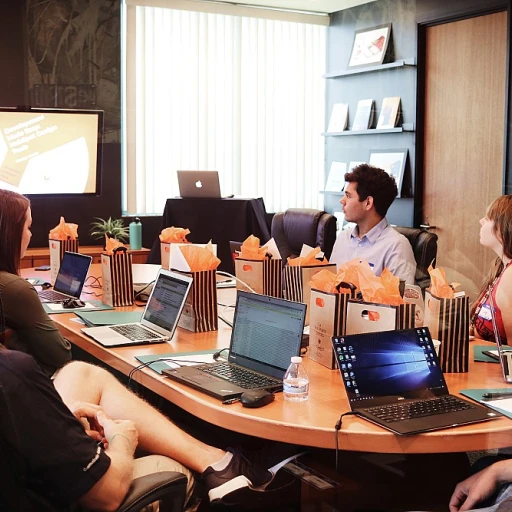
The Importance of Reskilling in the Modern Workforce
The Need for Adaptation in Evolving Careers
In today's fast-paced business environment, the concept of reskilling has emerged as a crucial element for sustaining workforce relevance and effectiveness. As industries continue to evolve at an unprecedented rate, driven by technological advancements and shifting market demands, the traditional job skills that once sufficed are increasingly becoming obsolete.
This evolution necessitates a focus on not only acquiring new skills but also enhancing existing ones. The skill sets that were once considered valuable are being continuously redefined, emphasizing the need for both hard and soft skills. These skills include critical thinking, problem solving, time management, and technical expertise, which are now seen as essential in meeting the demands of modern job roles.
The Factor of Production and Its Impact
Reskilling goes beyond merely responding to changes in job requirements. It's about preparing employees to effectively harness the factors of production, namely labor and capital. This approach ensures that human skills are optimally utilized, which in turn enhances the production of goods and services. As human capital evolves, so too must the skills that support it.
Empowering Employees through Reskilled Careers
For employees, the process of reskilling presents both a challenge and an opportunity. On one hand, it involves adapting to new learning paradigms; on the other, it opens pathways to career development and advancement. Transferable skills acquired through reskilling empower individuals to shift seamlessly between roles and even industries.
Ultimately, continuous learning and development are not just trends; they are necessities. They equip employees with the tools needed to thrive in an uncertain and rapidly changing work landscape. Both employers and employees must commit to a culture of ongoing skill enhancement. For more insights into creating a comprehensive skills inventory for effective reskilling, visit our blog on building a comprehensive skills inventory.
Identifying Core Skills for Creation and Innovation
Pinpointing Essential Skills for Success
Understanding the skills workers use to create is pivotal in today's rapidly evolving job market. Both employees and employers are consistently identifying which core skills can foster innovation and drive business success. In this context, skills act as the life force of any thriving industry, with workers utilizing their capabilities to transform ideas into tangible goods and services. For individuals seeking growth, skills pertain to a fusion of technical, soft, and human abilities. Technical skills encompass specialized knowledge to perform specific tasks, while soft skills involve interpersonal interactions and effective communication—both vital in collaborative settings. Together, these skills help forge stronger teams and empower employees to excel in their respective roles. Moreover, employers share a responsibility to foster continuous learning environments, where job skills development is more than just an option—it's an integral part of the business strategy. This approach not only facilitates career progression for workers but also enhances overall job satisfaction. Navigating this landscape requires pinpointing the skills that matter the most. It's not just about enhancing technical skills; human skills, such as problem-solving and critical thinking, are equally important. These are often considered transferable skills, adding value across different industries and roles. To align worker skills with market demands, companies need to focus on skills gap analysis. Identifying these gaps is crucial in creating a tailored reskilling and upskilling strategy that meets current and future needs. For more on this process, you can explore mastering the art of skills gap analysis for effective reskilling. By identifying and nurturing these core skills, employees can better navigate the complexities of the modern workforce, ensuring they remain valuable assets within their organizations while contributing effectively to the production process.Challenges in Reskilling: Overcoming Barriers
Obstacles Hindering Progress in Reskilling
Reskilling initiatives can face numerous roadblocks that both employers and employees must navigate to ensure success. Recognizing these potential barriers is the first step toward effective change. One of the primary challenges is the rapid pace of technological advancements. As new tools and methods emerge, employees need to consistently update their job skills, encompassing soft skills like critical thinking and problem solving and technical skills that are essential in today’s job market. This demand calls for continuous learning but can often overwhelm employees who struggle to juggle their current roles with the added pressure of learning new skills. Furthermore, skills gaps in both soft and hard skills can be a significant hurdle. Soft skills, like effective communication and team collaboration, are crucial for career growth, yet they are often undervalued compared to more concrete technical skills. Employers who recognize the importance of a balanced skill set will be able to better support their teams in this evolving work environment. Another barrier is limited access to tailored training and development programs. Employers might not allocate sufficient resources for skill-building, leaving employees to navigate reskilling upskilling paths on their own. Companies need to invest in human capital, including offering flexible time arrangements for learning, to ease this transition. A valuable resource, unlocking potential with intern academy, offers innovative pathways that can address such barriers by providing structured learning opportunities. Time constraints also contribute to the reskilling challenge. Employees often struggle to find the time needed to engage in reskilling activities while maintaining their workload. Effective time management strategies must be employed to fit continuous learning into their schedules without causing burnout. Lastly, motivational and engagement issues can stand in the way. Employees may lack the drive to pursue new learning due to perceived job security, fear of change, or lack of immediate rewards. It is essential to cultivate an organizational culture that values lifelong learning and career adaptability, paving the way for personal and business growth. Understanding and addressing these challenges can significantly enhance the efficacy of reskilling efforts, ultimately contributing to a more agile and competitive workforce.Effective Strategies for Successful Reskilling
Proven Pathways to Acquiring New Skills
Reskilling can be a daunting task, especially when faced with evolving demands in the workforce. One of the key ways to ensure success is through the implementation of effective strategies that cater to both employees and employers. For employees, embracing a mindset of continuous learning is crucial. This involves actively seeking opportunities for development, which could encompass both technical skills and soft skills like communication and time management. These skills are essential for enhancing problem-solving abilities and critical thinking. Employers have a significant role in facilitating the reskilling of their workforce. Investing in human capital ensures that employees are equipped to handle new challenges and contribute effectively to the business. This might include offering flexible work arrangements that allow employees the time needed to focus on learning. It can also involve fostering an environment that encourages collaboration among team members. Incorporating tailored training programs is another effective strategy. These programs should be designed to address specific skills that an organization requires, balancing both hard skills and soft skills. Utilizing resources such as workshops, online courses, and on-the-job training can provide employees with the transferable skills they need to navigate changes in their careers and the labor market. Additionally, setting clear career pathways within an organization can motivate employees to engage in upskilling and reskilling. By identifying critical skills that align with personal career goals and business objectives, employees can more effectively manage their job skills and career development. Overall, these strategies can help bridge the skills gap, turning potential barriers into stepping stones for both individual and organizational growth. Being proactive and adaptable in this ever-changing landscape is key to ensuring long-term success for businesses and their employees alike.The Role of Employers in Facilitating Reskilling
The Vital Contribution of Employers in the Reskilling Revolution
In today's rapidly evolving marketplace, employers play a pivotal role in the reskilling and upskilling journey of their workforce. Recognizing the shift in the business landscape due to technological advancements and evolving customer demands, employers are increasingly taking proactive steps to invest in their employees' development. Companies that prioritize reskilling efforts not only improve their human capital but also maintain a competitive edge. By identifying and nurturing both soft skills such as problem-solving, critical thinking, and time management, alongside hard skills and technical skills, organizations enable their employees to contribute more effectively to the creation of goods and services. This commitment not only affects the success of the business but also the career progression of individual employees. Employers facilitate reskilling through:- Providing Training and Learning Opportunities: Offering structured learning opportunities, whether internally designed or through collaborations with educational institutions, helps employees acquire new skills. This may include flexible learning programs, workshops, and access to online courses.
- Encouraging a Culture of Continuous Learning: Creating a work environment where continuous learning is encouraged promotes the development of transferable skills that employees can apply in various roles within the company.
- Investing in Leadership and Soft Skills Development: While technical skills are crucial, enhancing soft skills such as communication, teamwork, and adaptability are equally important. Skills soft are at the core of building strong teams that drive innovation.
- Recognizing and Rewarding Development Efforts: Acknowledging employees who take the initiative to reskill and upskill motivates others to follow suit, fostering a culture rich in learning and personal growth.
Future Trends in Workforce Skills and Reskilling
Anticipating Workforce Skill Evolution
The landscape of workplace skills is ever-evolving, and recognizing future trends is crucial to staying ahead. As technology advances, technical skills will become increasingly crucial, demanding a continuous learning approach from employees. Employers who facilitate such developments will have the advantage of a nimble and competent team ready to tackle future challenges.
While technical skills are instrumental, the importance of human skills, including problem solving, teamwork, and critical thinking, cannot be overstated. These soft skills help employees adapt to changing landscapes, providing versatility that technical prowess alone may not achieve.
Interestingly, as businesses navigate through these shifts, they'll observe that both soft and hard skills are crucial in creating a robust human capital. The integration of skills includes a blend of these components, ensuring a holistic skill set geared toward innovation and excellence. Anticipating these developments, businesses must invest in skill development, nurturing employees who are equally adept at technical tasks and human-centric roles.
Furthermore, the growing emphasis on environmental and social governance has prompted organizations to enhance their goods services responsibly. This shift affects workforce trends, driving the need for skills that support sustainable practices.
Harnessing the Potential of Continuous Learning
Embracing a culture of continuous learning is paramount to adapt to these workforce changes. As factors production redefine job roles, employees must actively engage in reskilling and upskilling initiatives to align with business objectives and sector changes. Employers can capitalize on these transformations by fostering a sense of development, providing tools and resources for skill enhancement.
Ultimately, the workforce of the future will be characterized by its ability to quickly assimilate new information and apply it effectively. Whether in technical or soft skill domains, the capacity for ongoing skill enrichment will shape not only individual career trajectories but also the wider business success.













